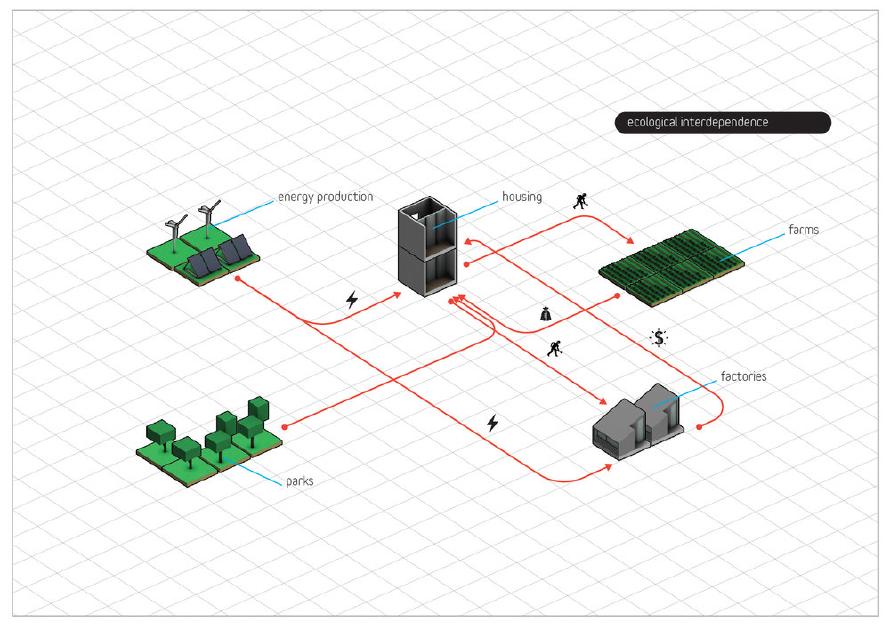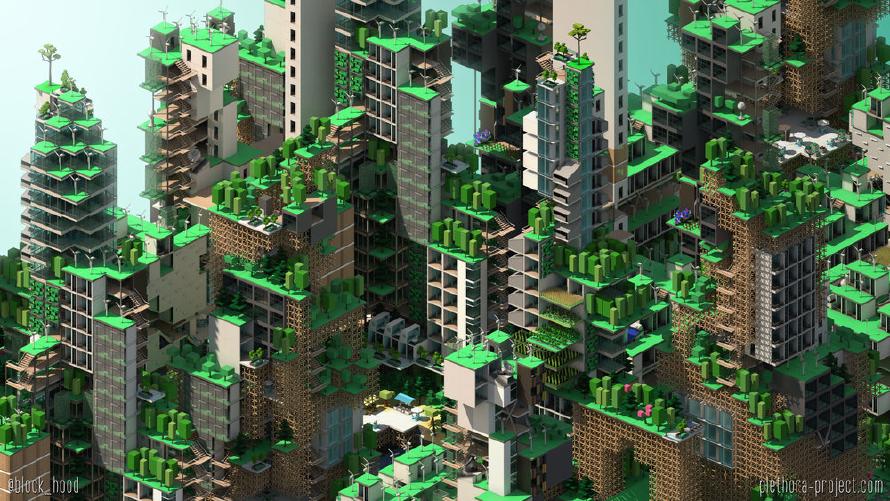Block’hood
The Plethora Project (or perhaps it’s “Plethora-Project”, they can’t make up their mind, and that annoys me), is a “design studio with a mission to accelerate computational literacy in the frame of Architecture and Design.” In 2017, they released Block’hood, a city building simulator video game that focuses on ideas of ecology, interdependence and decay. From the screenshots, it might resemble a tower building game, but it’s not. In Block’hood, you don’t create towers, but entire create ecosystems, called hoods, with the goal of making them self-sufficient.
I really like the premise of the game. It reminds me a lot of The Settlers series, of which I played a few of the titles for hours on end. The ecosystems in The Settlers are pretty basic compared to those in Block’hood, though. In The Settlers, you would plant some wheat, harvest, make flour at the mill, then a baker would make bread from one part flour, and one part water. An equivalent ecosystem in Block’hood would be similar, but involve a lot more components, or “blocks” as they are called in the game, and be more complex. Blocks in a Block’hood ecosystem more often than need several inputs to function, and produce both products and bi-products.
Let Them Have Bread
Take the bakery as an example. It requires wheat, labor, and consumer. With that input, the bakery outputs bread, money, and organic waste. The bread that is produced can either be sold directly at the bakery, or at a local café. In addition to bread, the café requires consumer, and labor to work. It also take roasted coffee as an optional input. The café then produces money, community, and organic waste, and everything in greater numbers since the café is on a higher level in the ecosystem than the bakery.
Organic waste is a bi-product that has to be handled somehow as too much of it will have ill effects on your hood. One way to get rid of organic waste could be to make an incinerator. It produces electricity, which is good. But the incinerator also creates both green house gasses, and pollution, which are not so great. These two bi-products also have to be dealt with somehow. So, yeah, complex stuff, and a very intriguing concept.
Unfortunately, the Plethora Projects execution in Block’hood has its flaws.

Click for Destruction
A game this complex needs a tutorial, something the developer has been kind enough to add. It takes you to the basics of making a functional ecosystem, while at the same time handling waste and decay. The tutorial features some very nice background music, but it restarts every time a new tutorial starts. They are quite short, so after a while the music starts to sound a bit like a scratched record.
Playing the tutorial reveals some of the shortcomings of Block’hood, many of which are related to the user interface. The game uses a three-dimensional, isometric view, and the player can move the camera by rotating, panning, and zooming in and out. It’s often difficult to move the camera correctly, mainly because of how it rotates. The camera doesn’t rotate around an imaginary y-axis in the center of the screen, but rather a y-axis in the center of the hood you’re working on. Because you might have zoomed and panned the camera away from the center of the hood, rotating often makes you totally lose track of where you are in the hood.
Placing blocks feel clumsy, and awkward, and the broken camera rotation doesn’t help. When placing blocks there is a good chance you’ll place it on the wrong tile. I suspect the developer tried to mitigate this by making placing blocks a click-hold operation - you click the mouse button, and hold it for a second before the block is actually placed on a tile. That way, it can sometimes be possible to see that you’re about to place a block on the wrong tile. But the click-hold approach falls flat on its feet. It rarely saves your from misplacing blocks, and because you have to wait, it takes a second to place a block.
And just to top it off, the Plethora Project has, for some weird-ass reason, decided that bulldozing a tile should be a click-only operation. Bulldozing the wrong tile is often way more devastating than building a new block on the wrong tile.

There Will Be No Saving Here
In addition to the tutorial, Block’hood also features a story mode. Interestingly, the story mode feels very much like a tutorial. It’s holding your hand through yet another range of different tasks you have to complete. Block’hood is a rather complex game, so it’s good to get some help, but I feel like the Plethora Project could’ve dropped the tutorial. My major gripe with the story mode, though, is that you can’t save during a chapter. Instead, the game automatically saves when you finish a chapter. That wouldn’t have been a big issue if the chapters only were a few minutes long. But some of the later chapters can last for quite some time - I think one of them took my an hour to complete.
I absolutely detest games that use fixed save points. Developers who use fixed save points in their games assume that every gamer lives a life where we can devote all our time to gaming, and that interruptions don’t exists. That’s not the case. Yesterday, I had to stop playing after half an hour because the kid woke up from her nap. Not a big problem, except that I couldn’t save the god damn game. So I had to restart the same chapter later. It actually took me three attempts to finish the last chapter in the story mode because I had to abort twice. The second that felt like a bore, and third time really felt like a chore. That’s not how you, as a game developer, wants you game to feel.
Not allowing players to save whenever they want to is like showing a big, fat middle finger in their faces.
Final Thoughts
I could go on about all the tiny problems in Block’hood that eventually make the game a hit-and-miss. But in an attempt to go out on a positive note, there probably is a good resource management simulation in there somewhere. The problem is that it’s being beaten to death by a sub-par user interface. If you don’t mind wrestling with that until your brain feels numb, you might enjoy Block’hood. Personally, I got tired of the game after the whole “you’re not allowed to save now, Dave” idiocy.
Give this game a try on Steam. If it makes you want to scream before two hours have past, use Steams very generous refund policy.
Feedback
This post has no feedback yet.
Do you have any thoughts you want to share? A question, maybe? Or is something in this post just plainly wrong? Then please send an e-mail to vegard at vegard dot net with your input. You can also use any of the other points of contact listed on the About page.